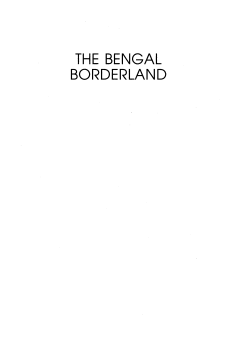
Additional Information
Book Details
Abstract
'The Bengal Borderland' constitutes the epicentre of the partition of British India. Yet while the forging of international borders between India, Pakistan, Bangladesh and Burma (the 'Bengal Borderland') has been a core theme in Partition studies, these crucial borderlands have, remarkably, been largely ignored by historians.
'The Bengal Borderland' constitutes the epicentre of the partition of British India. Yet while the forging of international borders between India, Pakistan, Bangladesh and Burma (the 'Bengal Borderland') has been a core theme in Partition studies, these crucial borderlands have, remarkably, been largely ignored by historians. While South Asia is poorly represented in borderland studies, the study of South Asian borderlands appears indispensable because here a major and intensely contested experiment in twentieth-century border making took place. Without direct reference to the borderlands as a historical reality it is not possible to understand how post-colonial societies in South Asia developed, the extent to which South Asian economies actually became bounded by borders, or the ways in which national identities became internalized. In examining this crucial region, Willem van Schendel challenges existing assumptions about the nature of relationships between people, place, identity and culture, and raises particularly urgent questions in the context of globalization, with its predictions of the 'end of geography' and a borderless homogenous world. This book will interest historians, geographers, political scientists and economists, as well as South Asianists and migration experts, and will appeal to academics, students and practitioners.
'Drawing extensively on the borderlanders' own vocies and experiences, and with many photographs, it paints a wonderfully rich and evocative portrait of more than half a century of Bengal borderlife…. The author has added a border study of enormous significance, and one of which border scholars everywhere should sit up and take note.' —Hastings Donnan, School of History and Anthropology, Queen's University Belfast
'In this comprehensive studey, Van Schendel looks at cross-border linkages, interterritorial economies, the culture of the borderlanders, the policies of the respective states, and goods… A must-read for those interested in understanding South Asian politics.' —'Choice'
Willem van Schendel is Professor of Modern Asian History at the University of Amsterdam and heads the Asia department of the International Institute of Social History at Amsterdam. Formerly, he held the chair of Comparative History at Erasmus University, Rotterdam.
Table of Contents
| Section Title | Page | Action | Price |
|---|---|---|---|
| Front Matter\r | 1 | ||
| Half Title\r | 1 | ||
| Series Page\r | 2 | ||
| Title\r | 3 | ||
| Copyright\r | 4 | ||
| Contents\r | 5 | ||
| Figures\r | 6 | ||
| Plates\r | 6 | ||
| Tables\r | 8 | ||
| Abbreviations\r | 9 | ||
| Note\r | 9 | ||
| Acknowledgements\r | 10 | ||
| Main Body\r | 11 | ||
| 1. Studying Borderlands\r | 11 | ||
| Notes\r | 27 | ||
| 2. Partition Studies\r | 34 | ||
| Notes\r | 43 | ||
| 3. Radcliffe's Fateful Line\r | 49 | ||
| Notes\r | 59 | ||
| 4. A Patchwork Border\r | 63 | ||
| Notes\r | 83 | ||
| 5. Securing the Territory\r | 97 | ||
| Notes\r | 113 | ||
| 6. Defiance and Accommodation\r | 128 | ||
| Notes\r | 148 | ||
| 7. The Flow of Goods\r | 157 | ||
| Notes\r | 185 | ||
| 8. Narratives of Border Crossing\r | 201 | ||
| Notes\r | 212 | ||
| 9. Migrants, Fences and Deportations\r | 220 | ||
| Notes\r | 245 | ||
| 10. Rebels and Bandits\r | 266 | ||
| Notes\r | 292 | ||
| 11. 'Rifle Raj' and the Killer Border\r | 306 | ||
| Notes\r | 327 | ||
| 12. Nation and Borderland\r | 342 | ||
| Notes\r | 366 | ||
| 13. Conclusion: Beyond State and Nation\r | 373 | ||
| Notes\r | 396 | ||
| End Matter\r | 408 | ||
| Appendix \r | 408 | ||
| References\r | 410 | ||
| Index\r | 429 |
